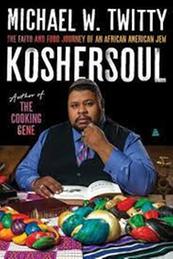
|
|
| Michael Twitty (photo: Brett Hartman) |
|
Culinary and cultural historian Michael W. Twitty's outstanding debut, The Cooking Gene: A Journey Through African American Culinary History in the Old South, was the recipient of two James Beard Foundation awards in 2018, for Best Food Writing and Book of the Year. He has appeared on NPR's The Splendid Table and Morning Edition, and has written for the Guardian, Ebony, Local Palate and the Washington Post. Twitty is creator of the award-winning blog Afroculinaria, the first food blog devoted to African American historic foodways and their legacy. A gay Jewish man of African American heritage, Twitty proudly straddles a constellation of overlapping identities, as explored and celebrated through the medium of cooking, food history and food culture in his second book, Koshersoul (Amistad; reviewed in this issue).
Koshersoul opens many doors for readers interested in the cuisines of the American South, as well as Afro Caribbean and Jewish diasporas. What ingredients, if any, work across the different cuisines you explore?
Onions! Garlic! Chicken! It's braising and grilling and baking and all the comfort foods.
You use the braiding of challah bread as symbolic of these intersectional cuisines. Do you bake challah often, and if you had to recommend your favorite bakery version, which would it be?
I bake challah at least twice a month. I don't really live next to a kosher bakery but even if I did, the Beigel family challah from Joan Nathan's Foods of Israel Today is the best I've ever had.
One the many difficulties for people fleeing their homes, whether because of floods, storms or political unrest, is leaving behind their treasured belongings. What is the one kitchen utensil you will never part with and why?
 Hmm. I'd have to say it would be my cook pot from Africa. It's my roots; with your roots you can do anything and go anywhere and it makes the best jollof rice.
Hmm. I'd have to say it would be my cook pot from Africa. It's my roots; with your roots you can do anything and go anywhere and it makes the best jollof rice.
One of your goals in writing Koshersoul is to remove labels and just be who you are. Why do you think people are more comfortable within the defined lines and labels of identity, instead of seeing it as something fluid, as you do?
It's because they can't face that we are all happily contaminated with each other's cultures and cuisines and that's always been America.
There are many different types of blessings in Judaism, you write. If you were to create a new blessing, what would that be?
Blessed are you Lord our G-d Master of the flame and the wood. A blessing on barbecue.
With the vast spectrum of cultures represented in different foods, and food's ability to blur cultural lines, should cooking be taught in schools as one more tool towards promoting cultural tolerance?
Absolutely. It's necessary for us to be an informed multicultural society and understand how much we have borrowed from each other. We have to constantly affirm we are not a monolithic people in any way and children have the ability to pick things up.
Would you be interested in teaching a cooking class for elementary school children? How early should children learn how to cook?
No, lol! But I'd say 6 or 7 years old, just like it was for me.
As we head into fall, what does your idea of a perfectly cozy day look like beyond the kitchen?
Sitting on my porch with hot apple cider is magic. --Shahina Piyarali

